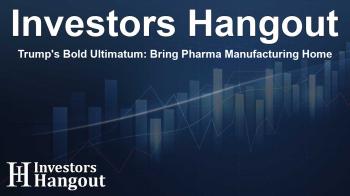Trump's Bold Ultimatum: Bring Pharma Manufacturing Home

Trump's Strong Warning to Pharmaceutical Companies
Recently, former President Donald Trump delivered a stern message to pharmaceutical manufacturers, urging them to relocate their production processes back to the United States. He warned that failing to do so may result in significant tariffs on imported drugs.
The Meeting That Sparked Concern
In a closed-door session, Trump conveyed his demands to top executives in the pharmaceutical industry, stressing the urgency to shift production from overseas to domestic facilities. Industry leaders from Eli Lilly and Co., Merck & Co., and Pfizer Inc. were present, all making a concerted effort to influence Trump's stance on drug pricing negotiations.
Pharmaceutical Executives Take the Stage
During the meeting, executives sought Trump's support to mitigate a law that enables the federal government to negotiate specific drug prices. The discussion also touched upon the industry's concerns regarding third-party entities, known as middlemen, which many in the pharmaceutical sector believe are inflating consumer costs.
Trump's Inconsistent Promises
Sources indicate that Trump did not provide any commitments to lobby Congress on behalf of pharmaceutical firms seeking relief from a drug pricing program established during Biden’s administration. This lack of support has left many companies anxious about their future profitability.
Implications for Drug Pricing and Medicare
Medicare officials recently announced the initiation of the next phase in their drug pricing negotiations, a move affecting major products like Novo Nordisk’s prominent weight loss drugs, Ozempic and Wegovy. This program aims to tackle high drug prices, a growing concern among American consumers.
Efforts to Lower Prices
Trump highlighted that the Secretary of Health and Human Services and his Medicare nominee are committed to making drugs more affordable. This aligns with his past claims regarding the need for reduced costs in the pharmaceutical industry.
Tariff Talk: A Return to Past Controversies
Trump’s announcement of potential tariffs on imported pharmaceuticals has rekindled debate over his previous criticisms of the industry. In the past, he labeled pharmaceutical companies as bad actors taking advantage of the system. Now, he sees tariffs as a potential tool to drive change.
Shifting Manufacturing and Market Reactions
Recent reports indicate that the U.S. imports about 36% of its pharmaceuticals, primarily from countries like Ireland, Germany, and Switzerland. Notably, the trend of importing drugs from China has notably surged, suggesting a growing dependency on foreign pharmaceutical manufacturers.
Impact on Biotech Stocks
The warning from Trump has caused a ripple effect in the market, significantly impacting shares of Chinese biotech companies such as WuXi Biologics, WuXi AppTec, and Pharmaron Beijing, all of which experienced substantial declines following the announcement.
The Call for Increased Domestic Manufacturing
Experts have suggested that Trump's call to bolster domestic drug manufacturing is pertinent, backed by findings from the Biden administration which linked drug shortages to capacity limitations. However, a study indicated that any capacity expansion could take two to three years, revealing the complexities of such shifts.
Conclusion
As discussions continue about the future of drug pricing and manufacturing in the U.S., the pharmaceutical industry remains in a precarious position. With key players such as Eli Lilly (NASDAQ: LLY), Merck & Co. (NYSE: MRK), and Pfizer Inc. (NYSE: PFE) facing the threat of tariffs and increased scrutiny, the next steps will be crucial in shaping the landscape of pharmaceutical manufacturing.
Frequently Asked Questions
What did Trump ask pharmaceutical companies to do?
Trump urged pharmaceutical companies to move their manufacturing back to the U.S. or face potential tariffs on imported drugs.
What was discussed in Trump's recent meeting with industry leaders?
The meeting involved discussions on drug pricing negotiations and the impact of middlemen on drug costs, as well as efforts to influence Trump's support.
What did Trump say about drug pricing programs?
Trump did not promise to support pharmaceutical companies in alleviating drug pricing programs established during Biden's administration.
How could tariffs affect the pharmaceutical market?
Tariffs could lead to increased costs for imported drugs, incentivizing companies to manufacture domestically and potentially impacting overall drug prices.
Which companies' stocks were affected by Trump's warning?
Biotech stocks such as WuXi Biologics and Pharmaron Beijing saw declines in their shares following Trump's announcement regarding tariffs and drug manufacturing.
About The Author
Contact Thomas Cooper privately here. Or send an email with ATTN: Thomas Cooper as the subject to contact@investorshangout.com.
About Investors Hangout
Investors Hangout is a leading online stock forum for financial discussion and learning, offering a wide range of free tools and resources. It draws in traders of all levels, who exchange market knowledge, investigate trading tactics, and keep an eye on industry developments in real time. Featuring financial articles, stock message boards, quotes, charts, company profiles, and live news updates. Through cooperative learning and a wealth of informational resources, it helps users from novices creating their first portfolios to experts honing their techniques. Join Investors Hangout today: https://investorshangout.com/
The content of this article is based on factual, publicly available information and does not represent legal, financial, or investment advice. Investors Hangout does not offer financial advice, and the author is not a licensed financial advisor. Consult a qualified advisor before making any financial or investment decisions based on this article. This article should not be considered advice to purchase, sell, or hold any securities or other investments. If any of the material provided here is inaccurate, please contact us for corrections.

